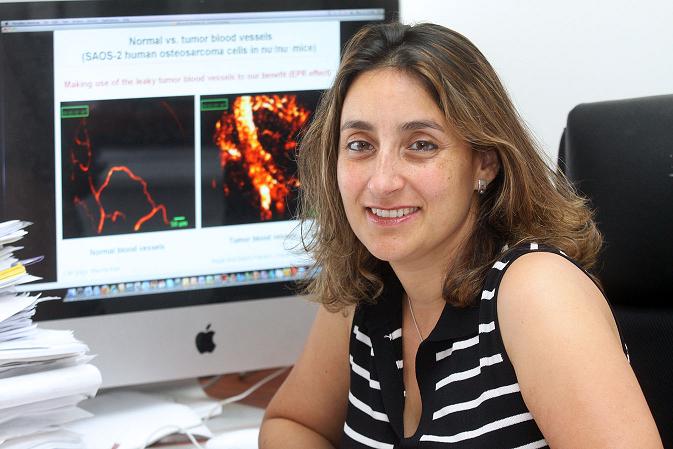Cancer tumors cannot develop and metastasize without a supporting and nourishing system of blood vessels The research team of Dr. Ronit Sachi-Painero at the Faculty of Medicine is developing nanometer drugs, which are delivered directly to the cancer tumor in order to damage the development of the blood vessels that feed it

"Angiogenesis, the creation of new blood vessels from existing blood vessels, is a phenomenon that occurs normally mainly in embryos during their development," explains Dr. Sacchi-Painero. "In a healthy adult, new blood vessels are formed only in certain situations, such as injury, menstruation or pregnancy. In contrast, there are at least 70 diseases associated with pathological angiogenesis, including cancerous tumors." When it comes to cancer, the creation of new blood vessels is actually a condition for the development and prosperity of the tumor. It is the blood vessels that supply it with oxygen and food, and the connection to the blood vessels allows cancer cells to penetrate the bloodstream, migrate to other places in the body and produce metastases. Many studies in the world show that in healthy people, of all age groups, there are microscopic foci of dormant cancerous tumors, 2-1 mm in size, but the vast majority of them will never become malignant tumors - for the simple reason that they are unable to cause the creation of new blood vessels that will feed them.
"The tumors remain dormant as long as they do not recruit blood vessels," states Dr. Sacchi-Painero. "The main question we ask in our research is: What causes change? How and when does the tumor begin to recruit blood vessels, which allow it to grow and send metastases? And most importantly: is the process reversible? That is, how can the formation of blood vessels be stopped, a tumor that has already 'awakened' be 'put to sleep' again, or metastases preserved in their dormant state?" These questions are at the center of the work of Dr. Sacchi-Painero's multidisciplinary research group, which includes 15 researchers from the fields of chemistry, biology, engineering, materials science and medicine.
A nanometer 'taxi' to the cancer tumor
In a joint and comprehensive effort, the laboratory researchers are developing drug carriers in nanometer dimensions, which carry a selection of effective substances in tiny amounts, directly to the cancerous tumor. The nanometer 'taxis', made of polymers, wander in the blood circulation, and cannot 'leak' out of normal and intact blood vessels. On the other hand, the new blood vessels, hastily built in the infected area, are nozzles, and the carriers flow from them into the cancerous tumor, and with them a diverse load of effective drugs: substances designed to inhibit the formation of new blood vessels, chemotherapy and anti-inflammatory drugs, as well as innovative biological substances of the siRNA type, that are able to silence genes involved in the cancer process.
In a variety of experiments, the researchers showed that nanometric systems of this type have several important advantages: First, the amount of material needed is much smaller than that introduced into the body in conventional chemotherapy treatments - therefore the treatment is less toxic, the side effects are minimal, and the drug can be used for long periods. Secondly, due to the small amount and the mechanism of entry into the cell, which is different from that of the free drugs, the cancer is less likely to develop resistance to the drugs, and they remain effective over time. And thirdly, the combination of several medicinal substances was found to be more effective against the tumor compared to a single drug.
"We believe that such treatments, using nanometer technology, will be able to keep potential tumors in their dormant state, and prevent the development of a cancerous tumor and/or malignant metastases," says Dr. Sacchi-Painero. "Such an approach may completely change the way cancer is treated: people in risk groups, patients who have recovered from cancer and fear its return, and also patients in a relatively early stage of the disease, will be able to receive convenient treatment, without side effects - which will prevent the onset of the disease, or turn it into a chronic disease, You can live with it, with a good quality of life, for many years."
Dr. Ronit Sachi-Painero serves as the head of the Laboratory for Cancer Angiogenesis and Nano-Biomedicine, as a senior lecturer in the Department of Pharmacology and Physiology at the Sackler Faculty of Medicine at Tel Aviv University, and as a visiting professor at Harvard University Medical School and Boston Children's Hospital. In addition, she serves as a consultant to several Israeli and international biotechnology companies, and as the president of the Israeli Association for the Controlled Release of Biomaterials. She published 42 articles, was a partner in the development of 16 patents, and won a large number of scholarships and prestigious international awards, including Fulbright, Rothschild, Wingate, Alon and Yoloden.
